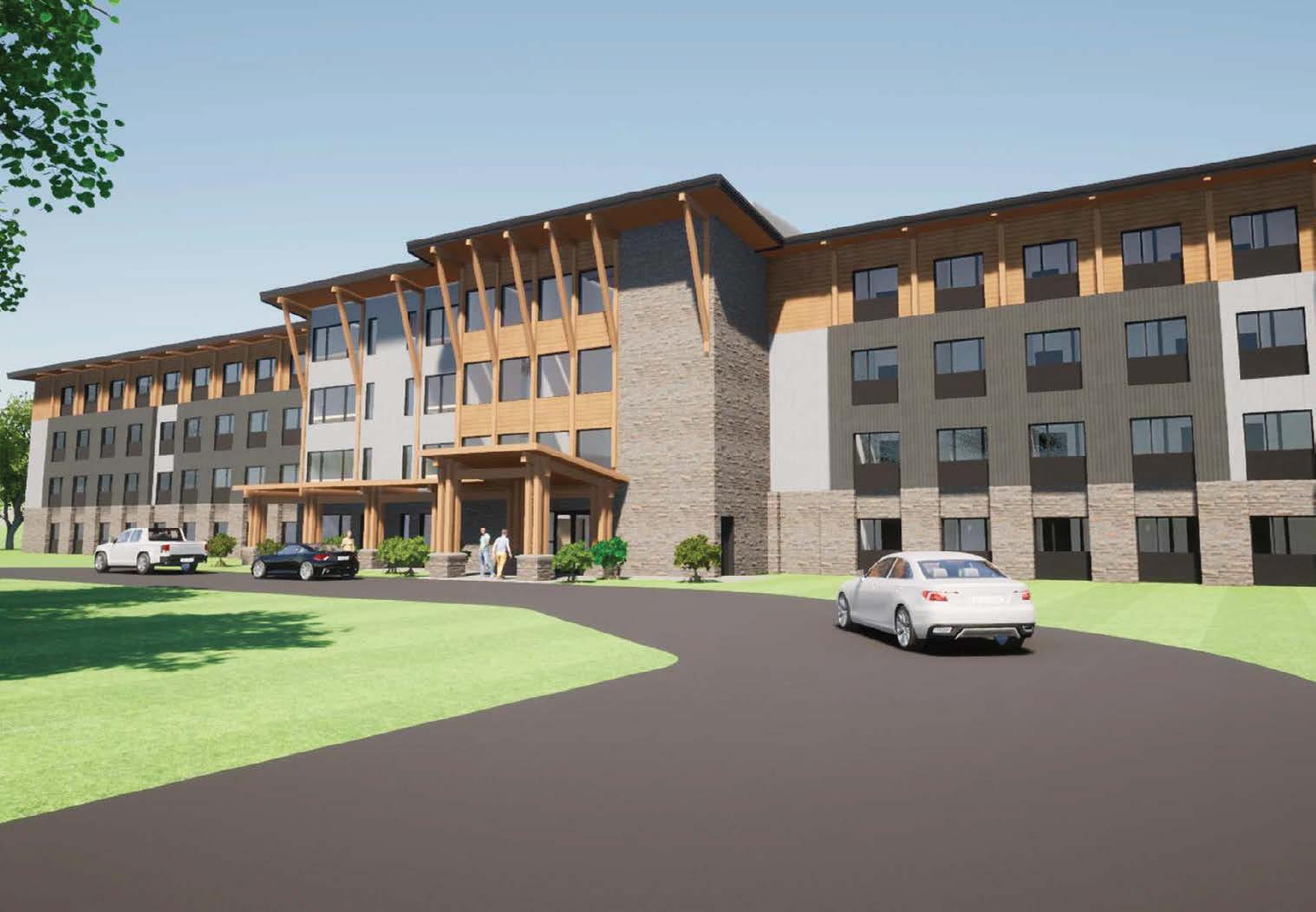
3 minute read
SKI TOWN LIFE
estimates it will need to house up to 250.
In 2017, Sugarbush launched its Tenants for Turns program, rewarding local homeowners who apply to rent to Sugarbush employees with lift ticket vouchers or a $100 season pass. But even with those incentives, Mad River Valley rents are often higher than many resort workers are able to pay.
“I looked into Tenants for Turns,” says Michael Kozinski, a lift operator at the resort. “In the end, the best I could do with Tenants for Turns was $300 a month more than employee housing. Now, I share the Christmas Tree Inn with 29 other workers, many from South America. It’s the most fun I’ve ever had and my Spanish is improving,” he says.
Now, the Alterra-owned resort is embarking on one of the most ambitious workforce housing projects the state has seen. On January 3, Sugarbush submitted two sets of applications to the Town of Warren Development Review Board seeking approval to redevelop the former Rosita’s Restaurant and three of the four so called “Sugar Cube” parcels to house Sugarbush Resort employees.
The Rosita’s project hopes to include a four-story apartment building with 16 studio apartments along with four floors of congregate living. The congregate living units include a total of 176 single occupancy bedrooms with shared living, dining, kitchen, bathroom, and laundry facilities.
The Sugar Cube project is looking at rebuilding three existing single-family dwellings. The redevelopment plan includes one 2-bedroom, one 4-bedroom and one 6-bedroom single family dwelling. “Workforce housing has been in short supply in the Mad River Valley for a long time. We believe these projects will support the resort’s employee housing needs for many years to come,” Hammond said in a statement.
Sugarbush has applied to put in a four-story building with 16 studio apartments and 176 single-occupancy bedrooms with shared living space.

Sugarbush is not alone. Killington fills approximately 1,800 jobs each winter and has been working with Castleton College, which has a campus at the mountain, to provide internships. In 2018, the resort bought the 39-room Mendon Mountainview Lodge and in the spring of 2022, Killington also purchased the 90-room Hillside Inn. Combined, both locations can house about 300 resort employees.
Around Vermont, resorts are looking for creative ways to find beds for their employees.
Vail Resorts recently announced it hoped to close on property in Ludlow where it plans to make a $1 million investment in long-term sustainable housing for its Okemo Mountain Resort employees. The new site, just a mile from the resort, would be developed to house 30 resort workers.
In Manchester, Stratton Mountain Resort has contracted with two more motels—the Depot Street Econolodge and Chalet Travelodge— to provide a total of 53 beds. Those properties would then open back up for public bookings in the off-season.
Smuggler’s Notch Resort hired 75 international student workers this season, many from South America. But when it came time to book the condos that have been used in the past, the resort realized many of these had become short term rentals. Instead, the ski resort turned to Johnson State College, where the nearby campus had empty dorm rooms.
“We’ve seen a decline in college-age student enrollment that’s been happening for well over 10, 15 years,” Michele Whitmore, dean of students at NVU-Johnson told VTDigger. “And certainly, Covid did not help with that.” The resort now pays the college $3,000 per employee per season and charges the workers $125 a week to cover their room, board and transportation. Like many resorts, Smuggler’s Notch also offers their seasonal workers season passes, free equipment rentals, and access to all the resort amenities.
As ski areas have raised their wages (minimum wage at Vail Resortsowned Stowe, Okemo and Mount Snow is now $20 an hour) and begun offering housing, it’s put pressure on other ski town businesses as well.

Chris Karr, who owns six restaurants in Killington and employs 150 people during the peak ski season, has started offering employees housing in nearby Rutland at a rate of $100 a week. “We can put an ad out that says we’re looking for staff and we’re fortunate if we get an application,” Karr told The Mountain Times “As soon as we put in that we have lodging options for people, the emails blow up.” Nearby, the Woodstock Inn houses 85 employees and is looking to add more.

Around Vermont, towns are also looking at solutions to the housing shortage, including raising taxes on or limiting short-term rentals. Burlington has limited short-term rentals to owner-occupied properties. In Woodstock, landlords can host no more than 6 short-term rentals a year, outside of foliage season. Killington, which has more than 600 short-term rentals, has required landlords to register their rental properties. Statewide, a short-term rental bill has yet to pass the legislature. But 2023 may bring new efforts to do so.
Until then, ski areas will keep looking for workers—and places for them to stay. u









